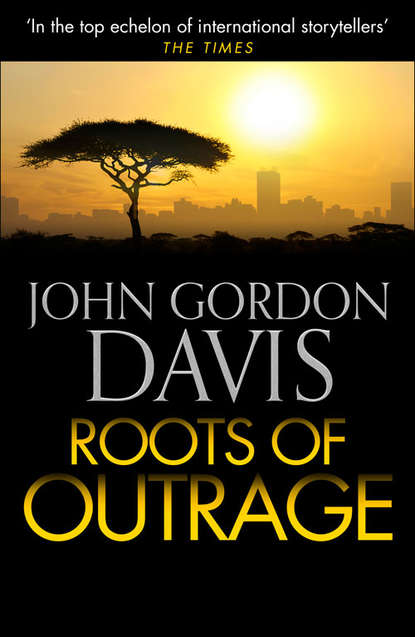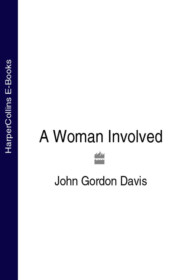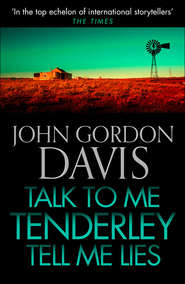По всем вопросам обращайтесь на: info@litportal.ru
(©) 2003-2024.
✖
Roots of Outrage
Автор
Год написания книги
2018
Настройки чтения
Размер шрифта
Высота строк
Поля
‘Well,’ Luke said, ‘after the war there was a food shortage. So the British government started a massive project planting peanuts, because they’re very nourishing, and it was called the Groundnut Scheme. They sent out all the seeds and fertilizer and tractors and stuff and hired thousands of blacks. But they made a terrible botch of it because nobody knew about peanuts, and in places they even ploughed cement into the soil instead of fertilizer because they couldn’t read. But the biggest problem was that they couldn’t persuade the blacks to stay on the job because they didn’t understand what money was. They didn’t understand that their wages could buy things, because there were no shops out there in the bush. So the whole scheme collapsed. Cost millions of pounds.’
Jill said, ‘Is that why that book about the Mau Mau is called Something of Value? Things in the shops?’
George Mahoney smiled. ‘Luke? You’ve read the book.’
Luke said: ‘What the book says is that if you take away a man’s tribal customs, his values, you must expect trouble unless you give him something of value in return. Your values. But if he cannot accept your values, because he is uneducated, then he is lost. Neither one thing nor the other. And that causes trouble. And that is what is happening in Africa.’ He looked at his father for confirmation.
‘Right,’ George said to his daughter. ‘The white man came along and said to the blacks: “You must not worship your gods, you must worship my God.” Then, “Now that you worship my God you cannot have more than one wife.” And, “Now that you worship my God you must stop selling your daughters into marriage.” And, “Now that you worship my God you must stop fighting, you must turn the other cheek, you must stop carrying your spears and shields, even though these are symbols of your manhood.” And, “Now that you worship my God you must be industrious, you must stop making your wives do all the work, and you must stop drinking so much beer, and of course you must stop following your traditional laws and obey the white man’s laws, and if you do not we will put you in jail.” Et cetera. And, after a while – decades in the case of Kenya, a hundred and fifty years in the case of South Africa – the black man eventually says: “Very well, now that I have given up my values I want all the advantages attached to your values – I want a good job and lots of money.” And the white man says, “I’m afraid you’re uneducated so the only job you can get is as a labourer, working for me.” And so this uprooted man has received nothing of value. His politicians say: “Then we want the power that is attached to your values, we want to be the government.” But the white man says, “Sorry, you’ll ruin the country.” So the black politician says: “We must rise up and drive the white man into the sea and then we’ll get something of value, because we’ll all be rich with a white man’s house and a car and a bicycle and a radio.”’
‘“And the nice Russians,”’ Aunt Sheila said, ‘“will help us get rid of the white man.” And the simple black man believes it all.’
Jill sighed, wagging her golden pigtails. ‘So if we can’t give him something of value it’s better to leave him in his tribe.’
George smiled. ‘That’s the African dilemma, isn’t it, my darling? But we didn’t leave him alone – we’re here, and we can’t undo that fact. The question is what do we do from here, to give him something of value?’
‘Not apartheid,’ Luke said.
‘So you want to give them all the vote?’ Aunt Sheila asked.
‘No,’ Luke said. ‘Because they’re still too uneducated. But we should give the civilized ones the vote. “Equal rights for all civilized men”, like in Rhodesia. Gradualism, that’s the answer.’
‘And what constitutes “civilized”?’ his mother asked.
‘Education,’ Luke said. ‘Maybe, second year of high school: Or a certain amount of money in the bank. If a man’s smart enough to make money, he’s smart enough to vote. That’s what they’ve done in Rhodesia.’
‘And Rhodesia will have plenty of trouble too,’ Sheila promised.
‘But meanwhile,’ Mrs Mahoney asked, ‘what about all the ones who haven’t got education or money but who’re demanding the vote and a white man’s job, house, car and bicycle? They won’t be satisfied with your gradualism, Luke, they’ll want the vote now. If you give the vote to some, they’ll all want it.’
‘Well,’ Luke said, ‘we’ll just have to be strict. Strict but fair. But to be fair we must abolish apartheid.’
George Mahoney nodded judicially. Jill said: ‘I agree. Apartheid,’ she pronounced, quoting her father, ‘stinks.’
Mrs Mahoney said: ‘Choose a more ladylike word, Jill. Why do you say that? Isn’t separateness the natural order of things, dear? We are separate, separated by civilization. The government is only legalizing the status quo.’
‘It’s doing a hell of a lot more than that!’ George said. ‘It’s setting the status quo in stone, to hold them separate and down there for ever. It’s damned unnatural to try to keep people apart – and it’s asking for trouble. Let people find their own level.’
‘Well, I think it’s perfectly natural for a civilized people to want their standards protected by the law. And thereby prevent trouble.’ She turned to Sheila. ‘George and I don’t see eye to eye on this little detail. Not that I’m a National Party lady, mark you – I’d vote for the United Party, if I dared, but George is an Independent and he’d divorce me – I’m never quite convinced those ballots are secret!’ She grinned at her husband. ‘I’d never vote for those horrid Afrikaners – I exaggerate of course – some of them are very nice – but I must say, darling, our Minister of Bantu Affairs, Hendrik Verwoerd, strikes me as a sincere man who believes he’s doing his best for the blacks in the long run.’
‘Hendrik Verwoerd,’ George Mahoney sighed, ‘is not a malicious man. And he’s probably sincere when he talks about apartheid as “a mighty act of creation” and “the will of God” – he believes he’s got the blueprint for successful co-existence between the races. And he has appointed the Tomlinson Commission to look into the viability of the black homelands becoming independent –’
‘Independent?’ Sheila asked, surprised.
‘Yes,’ Mrs Mahoney said. ‘Apartheid is evolving, my dear, to a higher moral plane –’
‘Yes,’ George said wearily to Sheila, ‘apartheid is evolving under Verwoerd, he does now talk in Parliament about giving the black homelands their independence, about dividing South Africa up into a number of black independent states and one white state, which will all live together side by side in a “constellation of southern African states”, bound loosely together in a kind of common market – Verwoerd doubtless does believe his own rhetoric when he says the blacks will be eternally grateful to us. It’s a pretty vision but it won’t work, because the homelands are barely capable of supporting the blacks now, in thirty years’ time they’ll be hopelessly inadequate, because the black population will have trebled. How’re all those people going to earn a living? They’re cattle-men, not factory workers –’
Mrs Mahoney interrupted mildly: ‘But he says industrialists will be encouraged with tax incentives to open up factories on the homelands’ borders to provide employment –’
‘Which is bullshit,’ George Mahoney said. (Jill snickered into her hands.) ‘I’m sorry, my dear, but it is nonsense. Because, sure, some industrialists will take advantage and open factories on the borders, but not nearly enough. The Tomlinson Commission –’ he jabbed his finger – ‘showed that the homelands could only support fifty-one per cent of the black populace as farmers. What happens to the other forty-nine per cent? Find jobs in the new factories? It’ll never happen. It’s a Utopian dream of Verwoerd’s.’ He turned to his wife. ‘And the hard fact remains that the black homelands are only thirteen per cent of South Africa’s surface.’ He shook his head at Sheila. ‘Oh, there’s nothing wrong in giving these so-called black homelands self-government – provided, as Luke says – ’ he touched his son’s head – ‘it’s supervised and done gradually, because the poor old black man has no experience of democracy – but the towering sin of Dr Verwoerd’s new-look apartheid is that it says to the poor black man: Thou shalt live and vote in thy inadequate homeland. Thou shalt only come out of it to work in if I need you and give you a Pass. Thou shalt live in impermanence in locations and squatter shacks. Thou shalt not have thy women and children living with you. Thou shalt have no political or social rights in my nice white South Africa where thou workest. Thou shalt return to your black homeland when I’ve had enough of your cheap labour. Thou shalt, thou shalt thou SHALT …’
George glared around the table, then said wearily to his wife: ‘Oh, Verwoerd’s vision is a fine one, on paper. But the arithmetic proves it’s a recipe for black pain, and poverty, and conflict. Rebellion.’ He sighed. ‘I tell him at every opportunity in Parliament.’
Mrs Mahoney shifted and said: ‘Darling, I’m all for the underdog. But I don’t consider that saying a black can’t be my next-door neighbour and keep his cattle in his backyard is exactly making him an underdog – he’s got his own territory, his own customs, and I have mine. I respect him but I do not want him as my neighbour.’
Luke said: ‘Mother, you’ve got five of them as neighbours already, in your backyard.’
‘Servants are entirely different. And talking about that, I don’t mind in the least you helping Justin with his homework, dear, but I won’t have him starting political discussions in my kitchen about the Russians coming, please?’
Jill said: ‘Well, Miss Rousseau says the Russians are already here.’
‘And she’s right,’ George said.
‘Who’s Miss Rousseau?’ Aunt Sheila asked.
‘Our new history teacher,’ Jill said, ‘and she’s brilliant.’ She added with a giggle: ‘And Luke’s in love with her!’
‘I am not!’ Luke glared. ‘I only said all the guys think … have got a crush on her!’
‘Except you?’ his father grinned.
That was another thing Luke and Justin had in common: their enthusiasm for girls. That year both of them had their first sexual experience. Justin had been through the Abakweta ceremony, living alone in a grass hut for six weeks, daubed in white clay and wearing a grass skirt and mask before emerging on the appointed day to be circumcised in cold blood with a spear: he was now a man, eligible to buy a wife when he could afford the cattle to pay lobola, the bridal price. Justin had lain with women. ‘Is it nice?’ Mahoney asked, agog. ‘Ooooh,’ Justin said.
Luke had been circumcised as an infant but his customs forbade him to lie with a woman yet; Luke’s earliest memories seemed to be of having a persistent erection he was incapable of doing anything about, and he was desperately determined to do something about it in his final year at school. Oooh is what Luke felt climbing the stairs behind the girls in their short gym skirts – if you contrived to be at the bottom of the stairs as they were approaching the top you could see right up to their bloomers. Oooh is what he felt sitting in class waiting for the girls to reveal a bit more thigh (‘beef’ it was called). Oooh is what he felt when he was allowed to grope his girlfriend of the moment but never allowed to take his cock out for a bit of reciprocity. Ooooooh is what he felt as Miss Rousseau unfolded the dramas of history with her creamy smiles, her breasts thrusting against her sporty blouse as she stretched to jot her ‘lampposts’ on the blackboard, her skirt riding a little higher up her lovely legs – for Miss Rousseau was also the girls’ gym mistress and came to school in short athletic skirts.
Luke wasn’t in love with Miss Rousseau as his sister teased – not yet – he was only madly in lust with her. All the boys were, and the girls idolised her: ‘She’s such fun!’ And she didn’t have a boyfriend! Oh, she had all the young men in town after her but there seemed to be none with brains enough to hold Miss Rousseau’s interest. ‘She says she’s very hard to please,’ Jill reported with the breathless smugness of one privy to royal confidences – ‘and she says we must all be when we grow up. None of these men are capable of having an interesting discussion, she says, she expects a real man to hold meaningful conversations, not just play sport, she says. She wants her mind wooed, she says …’
Her mind wooed … Miss Rousseau was very sporty and played a dashing game of hockey (you could often see right up to her bloomers as she dashed) and she loved watching rugby. Luke wasn’t really a rugger-bugger but he played so hard that year to impress Miss Rousseau that he made it to the first team. And on Fridays after school when he and Justin fetched his parents’ horses for the weekend from the country stables he rode the long way round into town in order to pass the girls’ hostel (that veritable cornucopia of beef bums and tits) because Miss Rousseau sat on the verandah marking books in the afternoons – in the desperate hopes of impressing her with a meaningful conversation about horses. But no such luck; she gave him a cheery wave, that’s all. He read in bed late into the night (with a hard-on) surrounded by history books, trying to dredge up obscure points to discuss with the wonderful Miss Rousseau, to have meaningful conversations about with the divine Miss Rousseau. (It wasn’t easy concentrating on all that heavy-duty history with all those hard-ons.) But it didn’t work. When he did manage to put one of his obscure points to her there was no discussion because Miss Rousseau knew all the answers and all he ended up saying was, ‘I see, Miss Rousseau. Thank you, Miss Rousseau.’ And there was no privacy for a meaningful conversation because he could only catch her in the school corridors. And she wasn’t interested in fuckin’ horses. So how the hell could a real man get to discuss anything? And then, one night, he thought of those family journals his great great grandfather Ernest had started, and all the obscure points therein.
But of course! What historian wouldn’t be interested in those rare journals? Their obscure detail was a goldmine for meaningful conversations. Burning the midnight oil, he feverishly dredged up a stockpile of obscure points before he made his move to grab the divine Miss Rousseau’s interest. And it worked.
‘What an interesting detail, Luke – I’ll have to look it up in Theal.’
‘I’ve checked Theal, Miss Rousseau, and he doesn’t say anything about it. Nor does Walker, Miss Rousseau.’
‘Where did you get your hands on Theal? He’s not in this town’s library.’
‘My father’s got the whole set of Theal histories, Miss Rousseau.’
‘I see. How lucky you are, even I don’t have the whole set. But where exactly did you get this detail, Luke – your great grandfather’s diary, you say?’
‘My great great grandfather’s journals, Miss Rousseau.’ (Stop saying Miss Rousseau every sentence!) ‘He was on the Great Trek and fought at Blood River. His son, and his grandson, fought in the Boer War, and they kept the journals going. My father kept them up, starting with World War I.’ He shrugged airily. ‘And, of course, I’ll keep them up, Miss Rousseau.’
‘Fascinating …’ Miss Rousseau said.
He blurted: ‘You can look at them any time you like, Miss Rousseau,’(Oh you tit …)
‘Oh wow – will you ask your father’s permission?’











